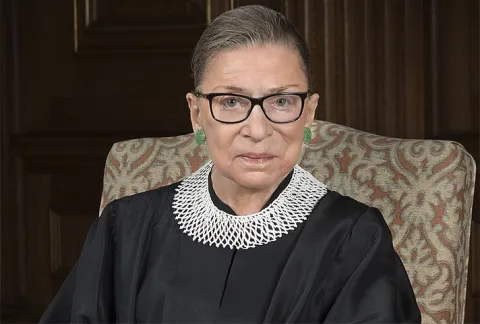
Justice Ruth Bader Ginsburg
A recent program honoring the 25th anniversary of a landmark case allowing women to enroll in the Virginia Military Institute (VMI) also celebrated a broader theme: Justice Ruth Bader Ginsburg’s decades-long effort to remove gender bias from state and federal laws.
The virtual program, co-sponsored by the U.S. Supreme Court Historical Society and the American College of Trial Lawyers, described the culmination of legal actions undertaken by Ginsburg when she was a lawyer for the American Civil Liberties Union (ACLU). The VMI case, and Ginsburg’s fight for women’s rights, also are featured in an article on the Women’s History Month page.
Speakers in the March 3 program about VMI included two lawyers who argued the Supreme Court case and two of Ginsburg’s former law clerks.
Justice Ginsburg “created an area of law virtually by herself and did it brilliantly,” said Paul Bender, a former U.S. deputy solicitor general who in 1996 successfully argued to allow women at VMI. “There’s probably more to be done, but she’s not around to do it anymore.”
Ginsburg, who died last year, recalled in a 2015 interview that “the law books of the country and the states were just riddled with gender-based classifications.” Many discriminatory laws, she said, were justified as protecting women.
In Reed v. Reed, a 1971 decision in which Ginsburg co-wrote the plaintiff’s brief, the Supreme Court for the first time ruled that a woman had been denied equal protection under the 14th Amendment because of her sex. A year later, she co-founded the ACLU Women’s Rights Project.
By 1980, when she joined the U.S. Court of Appeals for the District of Columbia Circuit, Ginsburg had argued six gender-bias cases before the Supreme Court. Gradually, the justices subjected discriminatory laws to increased levels of constitutional scrutiny.
During the anniversary event, Theodore Olson, who represented VMI, said he argued that an alternative women-only military program, the Virginia Women’s Institute for Leadership, was determined by some experts to offer “a better education in a single-sex environment.”
The Supreme Court voted 7-1 to end VMI’s male-only admission policy, and Ginsburg was assigned the role of drafting the opinion.
“The justice was thrilled to be able to draft this opinion for the court, after bringing case after case as a young advocate to establish gender equality before the high bench,” said Lisa Beattie Frelinghuysen, a law clerk under Ginsburg in 1996. “This was a very exciting opportunity for her.”
In her opinion, Ginsburg stated that VMI’s admission policy violated the 14th Amendment’s Equal Protection Clause.
“[G]eneralizations about ‘the way women are,’ estimates of what is appropriate for most women, no longer justify denying opportunity to women whose talent and capacity place them outside the average description,” Ginsburg wrote. “Such classifications may not be used, as they once were … to create or perpetuate the legal, social, and economic inferiority of women.”
With the VMI ruling, government-funded single-sex schools came to an end.
“It’s the capstone of her legacy on gender equality,” said Deborah Jones Merritt, an Ohio State University law professor who served as a law clerk for Ginsburg, while she was an appellate judge, and later for Justice Sandra Day O’Connor. “She knew that the two hardest hurdles for gender equality would be the military and single-sex education. In VMI, you really have the marriage of the two areas that were going to be the hardest to overcome.”
Ginsburg’s decades-long crusade for gender equality, and her elevation to the Supreme Court, mirrored the civil rights campaign for African Americans that climaxed with Brown v. Board of Education.
“She became the leading (and very successful) litigator on behalf of women’s rights—the Thurgood Marshall of that cause, so to speak,” wrote Justice Antonin Scalia, Ginsburg’s personal friend and the lone dissenter in the VMI case.
Frelinghuysen recalled that Ginsburg and she were invited to attend a program at VMI about 20 years after the landmark ruling.
“She did a talk at VMI, and we met with some of the first women cadets, as well as the current women cadets,” Frelinghuysen said. “She was very interested in how these cases actually affected the people involved in them. It was wonderful to … hear their gratitude, thanking her for opening the doors for them to pursue their dreams.”
Subscribe to News Updates
Subscribe to be notified when the news section is updated.
